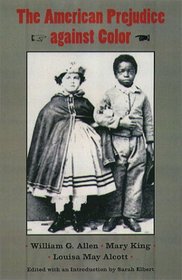Search -
The American Prejudice Against Color
The American Prejudice Against Color
Author:
In 1853, William G. Allen, the "Coloured Professor" of Classics at New York Central College, became engaged to Mary King, a student at the coeducational, racially integrated school and daughter of a local white abolitionist minister. Rumors of their betrothal incited a mob of several hundred men armed with "tar, feathers, poles, and an empty bar... more »
Author:
In 1853, William G. Allen, the "Coloured Professor" of Classics at New York Central College, became engaged to Mary King, a student at the coeducational, racially integrated school and daughter of a local white abolitionist minister. Rumors of their betrothal incited a mob of several hundred men armed with "tar, feathers, poles, and an empty bar... more »
ISBN-13: 9781555535452
ISBN-10: 1555535453
Publication Date: 11/7/2002
Pages: 224
Rating: ?
ISBN-10: 1555535453
Publication Date: 11/7/2002
Pages: 224
Rating: ?
0 stars, based on 0 rating
Publisher: Northeastern
Book Type: Paperback
Other Versions: Hardcover
Members Wishing: 0
Reviews: Amazon | Write a Review
Book Type: Paperback
Other Versions: Hardcover
Members Wishing: 0
Reviews: Amazon | Write a Review
Genres:
- History >> Americas >> United States >> 19th Century >> General
- History >> Americas >> United States >> General
- Literature & Fiction >> History & Criticism >> Regional & Cultural >> United States >> General
- Literature & Fiction >> Authors, A-Z >> ( A ) >> Alcott, Louisa May
- Nonfiction >> Social Sciences >> General
- Nonfiction >> Social Sciences >> Sociology >> Race Relations >> America
- Nonfiction >> Social Sciences >> Sociology >> Race Relations >> General
- Nonfiction >> Social Sciences >> Sociology >> Marriage & Family
- Nonfiction >> Social Sciences >> Specific Demographics >> African American Studies




